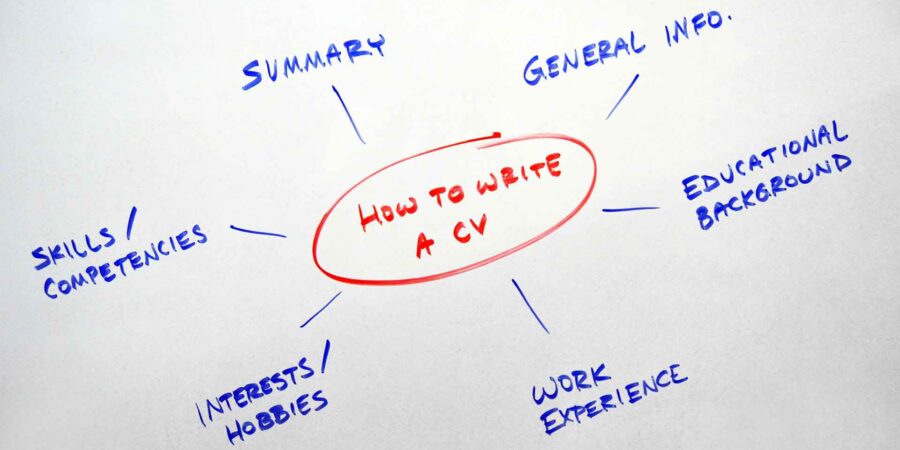The Curriculum vitae (CV) or cover letter is a brochure that is intended to present your know-how in an identified market. It highlights your skills and answers the following question: how does my background as a pupil and/or student correspond well to my application? To put it simply, it presents you in your best light.
How to write well a CV?
Your CV exists in two levels: the substance and the form.
Form is what you see first. Your CV should be short, legible, attractive, colourful and pleasant to read.
A CV should preferably fit on a single page, be written with a classic font (Arial, Myriad or Times New Roman in body 10, 11 or 12) on a white background.
The substance is what gives meaning, the essential. Your CV must express your identity and your background, make you want to know more, to ask you questions. Beware of spelling mistakes! Have it proofread by a loved one.
The essential information in a CV
Start your CV with a hook to attract attention. It can be a simple title, but you can also develop a quick presentation, making sure to stay clear and concise. Mention your experience if it is meaningful, your specialty or strengths, responsibilities you can take on and/or your professional goal.
Personal information
Place your personal information at the top left of your CV:
- First and last name (in capital letters),
- Address
- Date of birth
- Electronic mail
- Phone (specify What’s App and Viber),
- *your fingerprint, your presence on social networks (watch out for what we could find on you!)
Your education and skills
Give an overview of your education starting with your last university degree, before mentioning previous degrees, in antechronological order. Indicate the type and title of the degree, the name of the institutions, the thesis or dissertation topics you have written, and the year of graduation.
If you’re a recent graduate, you may not have much to mention in this section. In this case, you can mention your volunteer experiences, unpaid jobs or extracurricular activities.
- Personal skills (strengths, motivations, soft skills),
- Office tools / digital skills,
- Languages spoken,
- Hobbies and interests.
This section of your academic CV is not mandatory. You should only include it if you feel that your hobbies and interests support your application and are relevant to the position you are seeking. Highlight hobbies that have potentially contributed to the development of your technical and interpersonal skills. Don’t be too generic if you choose to add this section to your resume. Rather than indicating that you like sports, mention the sports activities you do, the number of years of practice and whether you compete.
How to make a CV without professional experience?
Everyone has something to say about their experience that is not only professional. It is interesting to take stock of all his skills and how they were acquired. As soon as they are related to the job profile, they have their place on a CV :
Professional: a student job, a professional immersion internship, internships during your studies, including that of college in 3rd;
Personal: volunteering in an association, role of class delegate or student representative.
Is this the right time to indicate your disability?
The candidate is recruited on his skills and motivations. It is usually better to talk about it, if appropriate, at the interview rather than on the resume.
HOW TO WRITE A COVER LETTER?
The cover letter, also called application letter or cover letter, highlights the skills and qualities of the candidate necessary for the success of his professional project. The letter is an essential tool to structure your speech during a job interview.

- Include Your Information
Start by indicating your name and contact information where you can be reached quickly.
2. Enter company information
Job descriptions often provide the name of the person to contact to apply or ask your questions. It is to this person that the cover letter is addressed by including the following items :
- Surname name
- Title (function)
- Company Name
- Company contact information
In cases where the hiring manager is not identified, search for him on Google, Linkedin or through your network of contacts.
- Note the subject of the letter
The subject of your letter will undoubtedly be the easiest to cover. Here, it is simply a question of writing the title of the position and / or the number of the offer.
- Summarize the essential skills in the content of the cover letter
In order to write your cover letter without having put a lot of time and effort into it, you can opt for a template that gives you the main lines. As an example you can use the following template by inserting your own information.



Leave a Reply